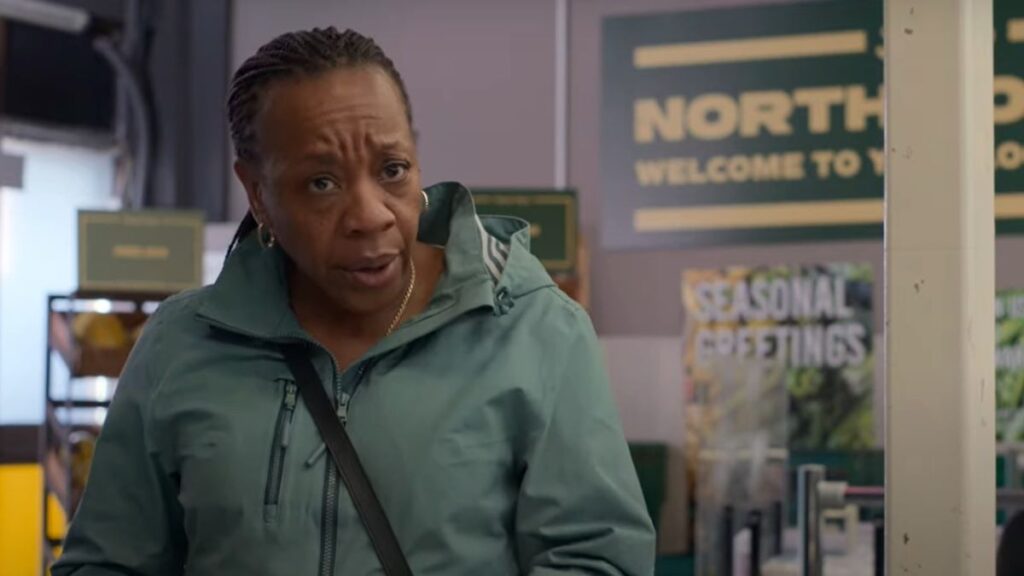We’re all downsizing these days. Forget the Roaring ‘20s – these are the Receding ‘20s. Costs are going up, people are staying in, and the spectres of the lives we once led lay heavy upon our newly diminished existences. The great gravy train of the 20th Century has seemingly come to a belated, sputtering crash stop over the past several years. All that’s left for those of us stranded in the wake of its crash, is to pick up whatever pieces we can and struggle on.
In Hard Truths, Mike Leigh’s first feature in six years, the struggle is real for Pansy (Marianne Jean-Baptiste). The pieces of the difficult life she once led were nevertheless not without promise. A nice home in London, a husband and a son, and an extended family in close proximity. But, as many viewers will likely identify with personally, those difficulties have recently only mounted. And the promise has depleted, leaving Pansy nervous, volatile, plagued by some undefinable ailment, and at unrelenting war with the world around her.
To her, an aging black woman in a Western world that’s becoming ever more hostile to most of its inhabitants. But particularly so for people in minority groups, it’s the world at war with her. And it’s how Leigh articulates the disparity between reality and Pansy’s perception of that reality that makes this movie as profound as it is.
Objectively, her behaviour, whether holding up a supermarket line with an extended, unprovoked outburst, or flying into a panic at the simple sight of a fox in her backyard, is unreasonable. And we’re never enlightened as to the true origin of her intense, all-consuming rage and pain. But Leigh and Jean-Baptiste build this character from a compassionate point. She has reason and right to feel disappointed, even angry at her circumstances. We’re never in any doubt that her emotions, as wild as they may be, are utterly valid, even as the actions they drive frequently cross some line or other.
That rage, that pain – Leigh does offer some insight into how Pansy developed them, though there’s no clear route drawn out from initial cause to eventual effect. Hard Truths is as its title suggests: knotty, complex, far from easy to parse out and make perfect sense of. Pansy can’t pick up the pieces of her life with jovial enthusiasm after some miraculous breakthrough or even catastrophic breakdown. There’s too much hurt in her past, too much damage in her present, and too little clarity in her future. Once again, Leigh demonstrates his peerless ability to portray reality as it is really experienced. With no simple answers nor cosy conclusions.
Yet, this is also a slightly different Mike Leigh. After financing issues delayed this movie’s arrival and engendered the longest gap between theatrical features in his career for over 30 years. Gone is the scale and scope of movies like Topsy-Turvy and Peterloo. And not just in academic details like runtime or production size.
Hard Truths feels refined, indeed reduced. It’s Leigh’s second-shortest theatrical feature. It’s economical with character and plot in a manner that recalls the work of other great filmmakers in their old age. Sets are humbly decorated, lighting is plain and lucid. There are none of the lovely little grace notes and apparently (though never truly) extraneous details that give many of his movies their wondrous sense of breadth. But it’s depth that Leigh is intent on delivering here. Not only does he succeed, but one also doesn’t miss the breadth. Such is the generosity of his characterizations and the incisiveness of every interaction that you leave feeling that you understand each and every character who’s passed your way, even if only for a moment.
A downsized Mike Leigh, then, remains a finer filmmaker than almost anyone else working today. And what a joy that he’s back working at all! And indeed this downsizing only accentuates his extraordinary talent. Every exchange in Hard Truths feels sincere, every observation feels thoughtful, and the whole movie feels timely and, as ever, strikingly astute. Pansy is a person unlike most of us, be that in her situation or in her demeanour, yet she’s never less than thoroughly recognizable. Maybe it’s the spectres of all the lives we all once led, or maybe it’s just basic compassion. But every viewer will surely be able to see some of Pansy in themselves, and Jean-Baptiste’s career-best performance is key to ensuring this essential process of identification. It’s a beautiful, integrally empathetic performance in a movie of the exact same qualities.

